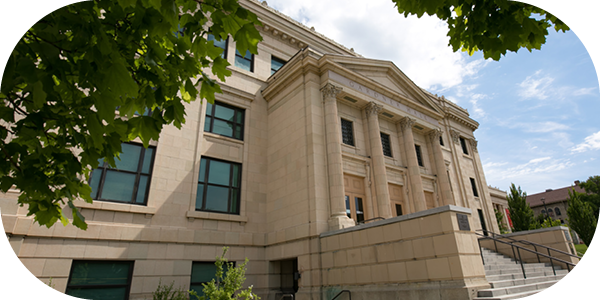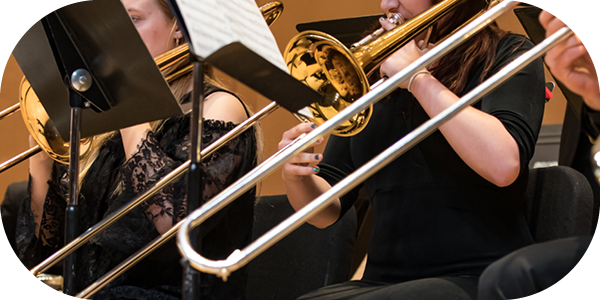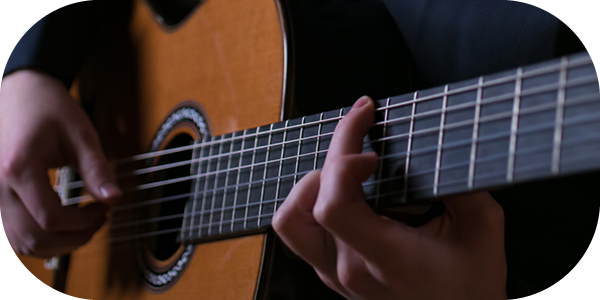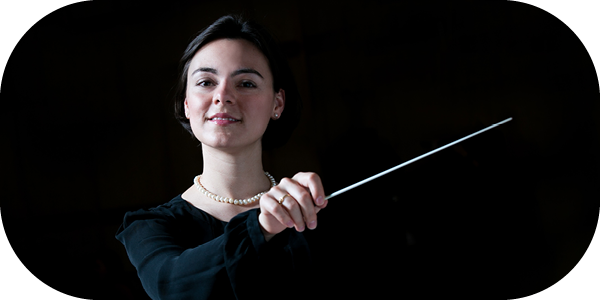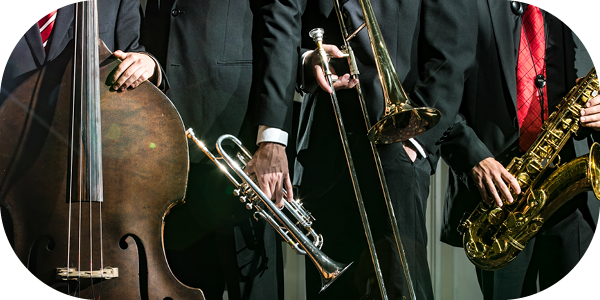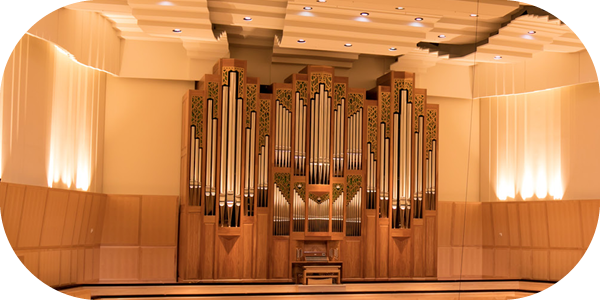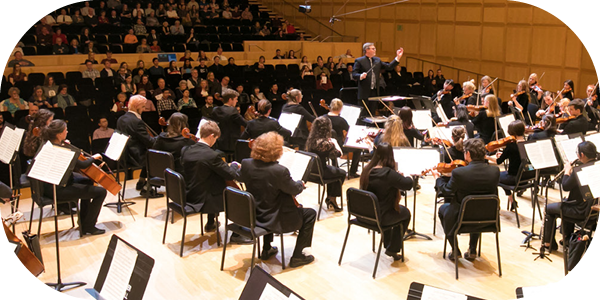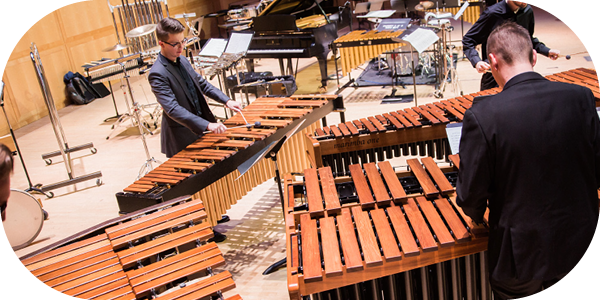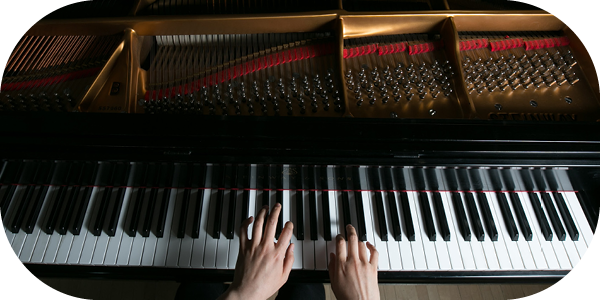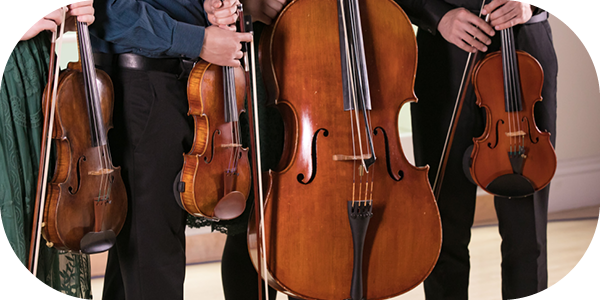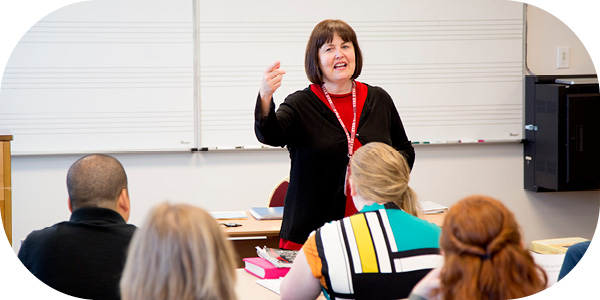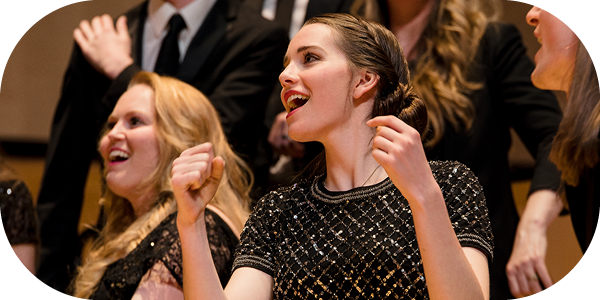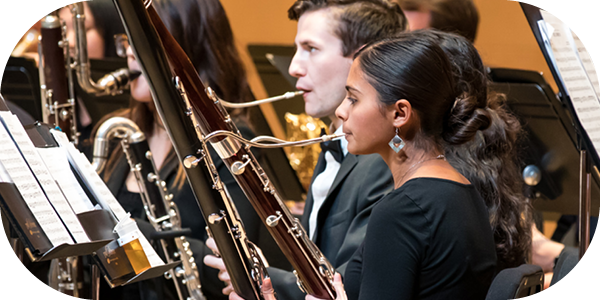
Programs & Degrees
With world-class faculty, an inclusive, student-focused learning environment, and over 350 students in 30 undergraduate and graduate degree programs, the School of Music educates professionally-oriented students in composition, conducting, instrumental performance, jazz studies, music education, musicology, music theory, pedagogy, and vocal performance. Through rigorous musical and academic experiences, students achieve excellence.
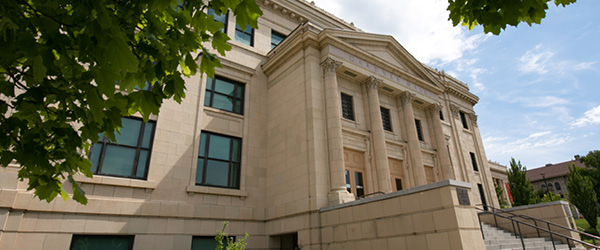
Bachelor of Arts, Certificates & Minors
The Bachelor of Arts degree in Music is a liberal arts degree with an emphasis in music. This degree is an ideal choice for students pursuing a double major or who wish to combine music studies with professional interests such as law, medicine, business, engineering, etc. The Bachelor of Arts in Music is a four-year, 122 credit hour emphasis consisting of degree requirements (private lessons, music theory, conducting, music history, large ensemble and liberal arts electives) and the U of U General Education Requirements and Bachelor's Degree Requirements.
Certificate in Music Entrepreneurship - This certificate is comprised of 21 credits of core music classes (including Career Development 1 and 2, Business of Music Making, and an Internship in Music), and several electives to choose from that are taught through the Eccles Business School. The purpose of this certificate is to provide the critical tools needed to prepare musicians to build their own successful performing businesses after graduating with their degrees.
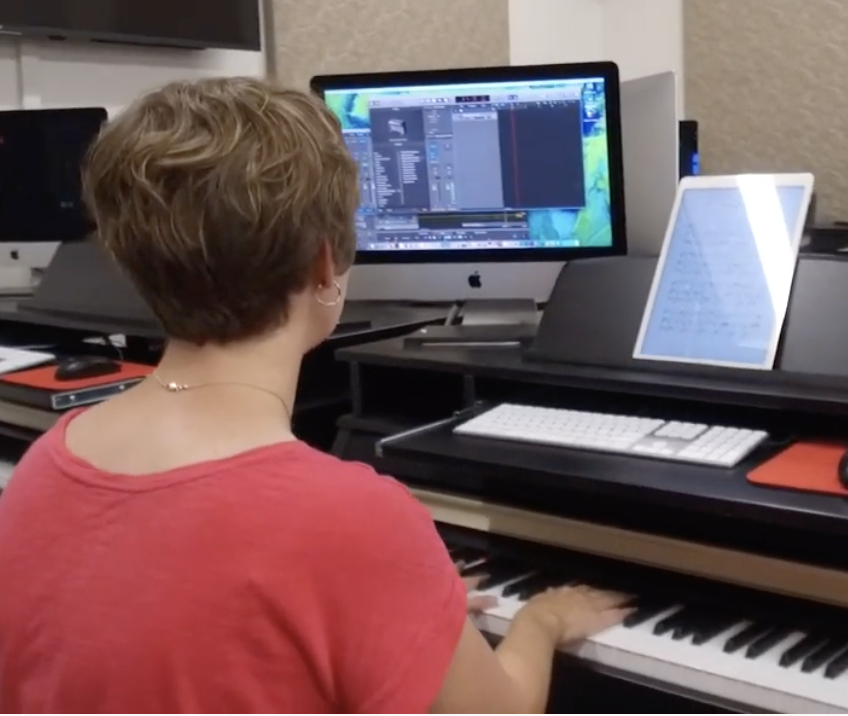 Minor and Certificate in Music Technology - The Music Technology Minor and the Music Technology Certificate are designed for
students who are interested in using technology to record, notate, and make music.
The music tech minor (for non-majors) and certificate (for music majors) cover all
the CMS/ATMI suggested tech competencies for music majors, as well as topics from
the Praxis exam. These include basic computer competence and OS X (Apple) lab management,
microphones, audio recording and editing techniques, word processing (as it applies
to music), copyright law, notation programs, digital audio formats and quality audio,
audiology and the nature of sound, multi-track studio recordings, mixing and digital
signal processing (EQ, reverb, delays, stereo imaging), synthesis theory (concrète,
sampling, filtering, FM/AM synthesis, physical models and additive synthesis), and
computer assisted composition, including algorithmic composition and AI.
Minor and Certificate in Music Technology - The Music Technology Minor and the Music Technology Certificate are designed for
students who are interested in using technology to record, notate, and make music.
The music tech minor (for non-majors) and certificate (for music majors) cover all
the CMS/ATMI suggested tech competencies for music majors, as well as topics from
the Praxis exam. These include basic computer competence and OS X (Apple) lab management,
microphones, audio recording and editing techniques, word processing (as it applies
to music), copyright law, notation programs, digital audio formats and quality audio,
audiology and the nature of sound, multi-track studio recordings, mixing and digital
signal processing (EQ, reverb, delays, stereo imaging), synthesis theory (concrète,
sampling, filtering, FM/AM synthesis, physical models and additive synthesis), and
computer assisted composition, including algorithmic composition and AI.
Minor in Music - The Music Minor (Voice, Piano, Organ, Brass, Guitar, Percussion, Strings and Woodwinds) is a 21 credit hour minor consisting of private lessons, ensembles, music theory, music history and other music courses.
Brass
With small classes, individualized instruction, and numerous opportunities for interacting with renowned composers and presenting personal compositions, students will develop an informed, unique musical voice.
The Brass Area seeks to promote growth of the total musician by assisting students in achieving a wide range of goals, from excelling as performers to learning the necessary skills to become master teachers.
Students develop skills through weekly lessons and ensemble participation, choosing from three orchestras, a wind ensemble, symphonic band, marching band, jazz ensembles, jazz combos, brass quintets and a trombone choir. In addition to learning from our expert faculty, students attend master classes from brass greats such as Gene Pokorny, Gail Williams, the American Brass Quintet, Marshall Gilkes, Mark Inouye, Adam Frey, Michael Mulcahy, and others.
Active professional musicians, our brass faculty open up hands-on learning opportunities for their students outside the classroom. The Utah Symphony, for which many of our brass faculty perform, gives students up-close access at rehearsals and and has hired some top students as substitutes.
Brass area graduates have experienced great success in the professional market as teachers and performers; recent hires include positions at the University of Iowa, Brigham Young University-Idaho, Texas A&M International University and many public schools. Locally, Ballet West's Utah Chamber Orchestra, the Orchestra at Temple Square and the Salt Lake City Jazz Orchestra have hired our graduates.
Curriculum Requirements
A BMUS in Instrumental Performance is a four-year, 126 credit hour emphasis consisting of degree requirements (private lessons, music theory, keyboard, conducting, music history, ensemble and additional music courses) and the U of U General Education Requirements and Bachelor's Degree Requirements. A senior recital is required.
The MM is a two-year, 31-34 credit hour program consisting of private lessons, bibliography, music history and literature, advanced music theory, pedagogy and ensembles. Two master’s recitals are required.
The DMA is a three-year, 59 credit hour program consisting of private lessons, large ensembles, music history and literature, advanced music theory, pedagogy, performance practice and courses in a related field. A dissertation essay and four recitals are required.
Degrees
- BM Instrumental Performance 2023-2024
- BM Music Education: Instrumental 2023-2024
- Bachelor of Arts in Music 2023-2024
- Minor in Music 2023-2024
- MM Instrumental Performance 2023-2024
- DMA Instrumental Performance 2023-2024
- Marching Band
- Pep Band
- Wind Ensemble
- Symphonic Band
- Philharmonia
- Philharmonia Chamber Orchestra
- Campus Symphony
- Jazz Bands
- Jazz Combos
- New Music Ensemble
- Early Music Ensemble
Faculty
Classical Guitar
The Classical Guitar Area seeks to produce well-rounded musicians with a thorough knowledge of the classical guitar literature, solid training in music theory and musicianship, as well as solo and ensemble experience. Students learn the broad literature for classical guitar, spanning transcriptions from the Renaissance period to recent twentieth century compositions. Students regularly compose music for the school's classical guitar ensembles, which perform two concerts a year, and are encouraged to participate in jazz guitar ensembles and combos to expand their ensemble experience.
Faculty members have performed for decades and studied with greats in the field, allowing them to expertly assist students with both musicianship and technique. In addition to studies with expert faculty, students have opportunities to take master classes from visiting artists, including in the past the Assad Brothers, Lily Afshar and Manuel Barrueco.
Curriculum Requirements
A BMUS in Classical Guitar Performance is a four-year, 124 credit hour emphasis consisting of degree requirements (private lessons, music theory, keyboard, conducting, music history, ensemble and additional music courses) and the U of U General Education Requirements and Bachelor's Degree Requirements. A senior recital is required.
Degrees
- BM Classical Guitar Performance 2023-2024
- BM Music Education: Instrumental 2023-2024
- Bachelor of Arts in Music 2023-2024
- Minor in Music 2023-2024
- Classical Guitar Ensemble
- Early Music Ensemble
Faculty
- Hasse Borup,
Classical Guitar Area Head - Sophie Stanley
- Todd Woodbury
Composition and Music Technology
With small classes, individualized instruction, and numerous opportunities for interacting with renowned composers and presenting personal compositions, students will develop an informed, unique musical voice.
The practice and study of composition has a long tradition at the University of Utah. The legacies of several trailblazing composers, including the illustrious Utah composer Leroy Robertson (1896-1971), the innovative Hispanic American composer Ramiro Cortés (1933-1984) and the electroacoustic music pioneer Vladimir Ussachevsky (1911-1990), have helped shape the dynamic character of the Composition Area and continue to inspire composition faculty to value innovative original work and the development of each student’s personal musical voice.
With an average of 25 composition students, 10 graduate and 15 undergraduate, the composition faculty can offer students individualized instruction and provide a stimulating environment that fosters the development of students’ creative and technical abilities in writing music. Each year, the area offers four student composers concerts, recorded reading sessions of student works with local professionals, and recitals and master classes from visiting artists and ensembles. Each semester, the Maurice Abravanel Visiting Distinguished Composer Series brings in a celebrated composer for a three-day residency that allows students to interact directly with renowned composers, such as John Adams, Milton Babbitt, John Corigliano, Mario Davidovsky, Lou Harrison, Jonathan Harvey, Tristan Murail, and Shulamit Ran, in an informal setting.
Our students typically go on to prestigious graduate programs or to teaching positions at academic institutions in the United States and beyond.
Curriculum Requirements
A BMUS in Composition is a four-year, 127 credit hour emphasis consisting of degree requirements (private lessons, music theory, keyboard, conducting, music history, large ensemble, composition, technology and additional music courses) and the U of U General Education Requirements and Bachelor's Degree Requirements. A senior project is required.
The MM is a two-year, 32 or 35 credit hour program consisting of individual instruction in composition, bibliography, music history and literature and advanced music theory. A master’s composition final project is required.
The PhD is a three-year, 62-64 credit hour program consisting of individual instruction in composition, music history and literature and advanced music theory. A doctoral thesis, composition and foreign language proficiency are required.
Degrees
- BM Music Composition 2023-2024
- Music Technology Minor 2023-2024
- Music Technology Certificate 2023-2024
- MM Composition 2023-2024
- PhD Composition 2023-2024
- New Music Ensemble
- Electroacoustic Ensemble
Faculty
- Miguel Chuaqui, Composition Area Head
- David Michael Cottle, Music Technology
- Elisabet Curbelo
- Luke Dahn
- Igor Iachimciuc
- Devin Maxwell
- Jessica Rudman
Emeritus
Conducting
The School of Music’s conducting program offers individualized and specialized training to a select group of advanced masters and doctoral students to develop skill as conductors for choral or instrumental ensembles at a professional level. Students receive this training in a rich learning environment with ample podium time.
In addition to conducting lessons and mentoring, students take a full sequence of advanced coursework including ensemble literature, programming, music theory, music history, performance practice, choral diction or instrumental techniques, and pedagogy. This tailored course of study provides our students with the depth of knowledge necessary for a professional career as a conductor or a university-level instructor.
With three orchestras, three large choirs and two symphonic bands, in addition to numerous smaller performing ensembles, conducting students are assured ample podium time, serving as assistant or apprentice conductors for major performances in some cases. With a professional orchestra, opera company and choirs close at hand in Salt Lake City, students have frequent opportunities to attend local rehearsals and concerts in a musically-rich community.
Curriculum Requirements
The MM is a two-year, 32 credit hour program in either instrumental or choral conducting. Courses consist of private conducting lessons, bibliography, music history and literature, advanced music theory, conducting seminars and large ensemble. A conducting recital is required.
The DMA is a three-year, 59-60 credit hour program consisting of private conducting lessons, large ensemble, music history and literature, advanced music theory, conducting seminars, performance practice and courses in a related field. A dissertation essay and four recitals are required.
Degrees
- MM Choral Conducting 2023-2024
- MM Instrumental Conducting 2023-2024
- DMA Choral Conducting 2023-2024
- DMA Instrumental Conducting 2023-2024
- Chamber Choir
- A Cappella Choir
- Voci Altissime
- Wind Ensemble
- Symphonic Band
- Philharmonia
- Campus Symphony
Faculty
Jazz Studies
Students receive world-class training in jazz arrangement, composition and performing from a dozen faculty musicians, internationally renowned guest artists and a musical community that actively supports live jazz.
Whether performing in our highly acclaimed ensembles, composing and arranging, or analyzing the vast repertoire, our students receive world-class training in all things jazz from more than a dozen outstanding faculty musicians. Jazz majors learn to compose and arrange effectively in the genre, develop an in-depth understanding of the musical and cultural history of jazz and succeed as active and creative participants in their musical communities, including serving as advocates for the art form.
With two big bands and a variety of small combos, the Jazz Area offers multiple opportunities for students to display their skills, from improvisation and collaborative performance to honoring stylistic practices unique to this creative genre. Salt Lake City is a musical community that actively supports live jazz, with opportunities to hear internationally renowned artists in and outside of the university at concerts and clinics, as well as events like JazzSLC at the Capitol Theatre and the Salt Lake City Jazz Festival.
The Jazz Area supports regular guest artist performances, master classes and clinics, as well as faculty recitals and unique collaborations with regional jazz ensembles and organizations. Our dedicated and talented students frequently participate and excel in competitions and perform as ensembles at major festivals. In 2010, the U of U Jazz Ensemble was honored to be the invited American guest at the 2010 World Expo Music Festival in Shanghai, China.
Curriculum Requirements
A BMUS in Jazz Composition is a four-year, 124 credit hour emphasis consisting of degree requirements (private lessons, music theory, keyboard, conducting, music history, ensemble, jazz, technology and additional music courses) and the U of U General Education Requirements and Bachelor's Degree Requirements. A senior project is required.
A BMUS in Jazz Performance is a four-year, 129 credit hour emphasis consisting of degree requirements (private lessons, music theory, keyboard, conducting, music history, ensemble, jazz, composition, technology and additional music courses) and the U of U General Education Requirements and Bachelor's Degree Requirements. A senior recital is required.
The MM is a two-year, 35 credit hour program consisting of private lessons, bibliography, music history and literature, advanced music theory, jazz ensembles and other jazz courses. Two master’s recitals are required.
Degrees
- BM Jazz Composition 2023-2024
- BM in Jazz Performance 2023-2024
- Bachelor of Arts in Music 2023-2024
- Minor in Music 2023-2024
- MM Jazz Studies 2023-2024
- Jazz Bands
- Jazz Guitar Ensembles
- Jazz Combos
Faculty
- Josiah Boornazian, Director of Jazz Studies
- Brian Booth
- Todd Campbell
- Randal Clark
- David Hall
- David Halliday
- Chris Hough
- Alex Rowe
- Donn Schaefer, Brass Area Head
- Patrick Terry
- Dan Waldis
- Kelly Wallis
- Brian Woodbury

Music Education
With emphases in instrumental, choral or music education and plenty of faculty mentorship, classroom time, and hands-on, school-based learning, students graduate prepared to teach full-time as music educators.
With degrees at the undergraduate, masters and doctoral levels, the music education area seeks to prepare students to become music educators of the highest professional caliber by offering a comprehensive curriculum based on cutting-edge research, providing ongoing mentorship from engaged faculty, and involving students in hands-on school-based learning throughout their academic experience.
Undergraduate music education majors choose instrumental, choral, or general music as areas of emphases. Depending on their instrument or voice, they gain expertise from the School of Music's more than 20 choirs, orchestras, bands and performing ensembles. Undergraduate students develop as music educators through coursework and personal guidance from faculty mentors. They also develop teaching skills through early and intensive field experiences in classrooms.
During their freshman year, they begin to observe and work with public school music teachers and progress to onsite pre-service teaching experiences, culminating in a final student teaching semester. These hands-on experiences prepare graduates to be effective music teachers. The coursework meets the requirements for a K-12 music teaching endorsement from the Utah State Office of Education.
Because many prospective graduate students work full-time as music educators, the School of Music offers masters and PhD music education degree programs that may be completed after school hours or during the summers, as well as flexible degree structures designed to meet a variety of student interests and areas of expertise.
Graduate students in music education have great flexibility in selecting their course work, with up to 12 credit hours of electives. Students can choose courses from a variety of areas within the School of Music, including applied lessons and ensembles. Students work directly with their major professor to determine how to accomplish their goals. The University of Utah is the only institution in Utah to grant a PhD in music education.
Curriculum Requirements
A BMUS in Music Education (Choral or Instrumental) is a four-year, 136 credit hour emphasis consisting of degree requirements (private lessons, music theory, keyboard, conducting, music history, large ensemble, education and additional music courses) and the U of U General Education Requirements and Bachelor's Degree Requirements. A senior recital and student teaching are required. Recital Guidelines; Student Teacher Preparation.
The MM is a two-year, 32 credit hour program consisting of bibliography, music history and literature, advanced music theory, music education and other music courses. Either a master’s project or thesis is required.
The PhD is a three-year, 65-67 credit hour program consisting of music history and literature, advanced music theory, music education, statistics and supporting area courses. A doctoral thesis is required.
State Teaching Licensure Requirements
To teach public school music, graduates must receive certification licensure through the Unviersity of Utah College of Education and the Utah State Office of Eeducation, a seprate process from completing degree requirements. For more information, download the files Teaching Certification and Licensure and the Utah Educator Licensure Application.
Degrees
- BM Music Education: Instrumental 2023-2024
- BM Music Education: Choral 2023-2024
- MM Music Education 2023-2024
- PhD Music Education 2023-2024
Faculty
- Emily Mercado, Music Education Area Head
- Jonathan Dillon
- Mark Ely
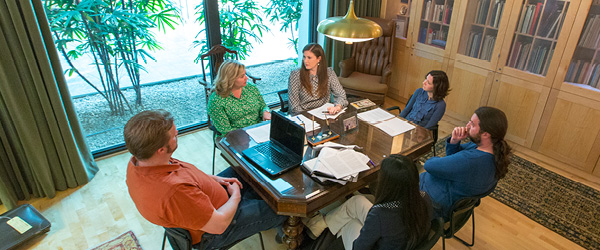 Musicology
Musicology
The Musicology Area provides students with a framework for culturally grounding diverse musical repertoires and implementing various research methodologies, allowing them to develop the knowledge, research tools, and communication skills necessary to flourish as skilled teachers, scholars and musicians.
From general surveys to focused courses on the intricacies of European art music and American musical theater, the area’s broad-ranging curriculum offers both diverse and specialized learning opportunities for students.
Along with an impressive faculty of highly accomplished researchers and musicians, the program provides students regular interaction with acclaimed performers, composers, theorists, and musicologists from across the world. Our outstanding facilities, equipped with state-of-the-art technology and three stunning concert halls, serve as venues for student, faculty, and visiting artist performances.
In addition to one-on-one mentorship from faculty and guest scholars, cutting-edge research is facilitated by the outstanding collections of musicological literature housed in the school’s McKay Music Library and the Marriott Research Library. Our master’s students establish an area of specialization by conducting original research under the guidance of a faculty adviser. Recent graduates have gone on to pursue advanced degrees in several of the most respected programs in the country.
Curriculum Requirements
The MA in Musicology is a two-year, 32 credit hour program consisting of bibliography, musicology seminars, advanced music theory, and additional arts and humanities courses. Foreign language proficiency is required. The degree culminates with the completion of a substantial thesis consisting primarily of original research.
Degrees
Faculty
- Elizabeth Craft,
Musicology Area Head - Bettie Jo Basinger
- Lisa Chaufty
- Cathy Clayton
- Jane Hatter
- Catherine Mayes
- Pam Jones
Organ
The School of Music’s organ program prepares students to become skilled performers well-versed in organ history, literature, design, pedagogy, and church music.
In addition to housing a six-organ practice room, the school also has three on-site practice/performance pipe organs: a Flentrop 3/4, Moller 2/7, and Lively-Fulcher 3/64, one of the most outstanding tracker organs in Utah.
The school’s Schreiner Organ Endowment supports master classes in collaboration with the local American Guild of Organists chapter. The school’s Organ Preparatory Program offers group classes and private lessons to the community, and organ majors receive hands-on teaching experience, under faculty supervision.
The surrounding Salt Lake City community offers numerous opportunities for organists and lovers of organ music alike, with the annual Eccles Organ Festival at the Cathedral of the Madeleine and daily organ recitals at the Tabernacle on Temple Square.
Curriculum Requirements
A BMUS in Organ Performance is a four-year, 124 credit hour emphasis consisting of degree requirements (private lessons, music theory, conducting, music history, large ensemble, organ and additional music courses) and the U of U General Education Requirements and Bachelor's Degree Requirements. A senior recital is required.
The MM is a two-year, 34 credit hour program in organ performance. Courses consist of private lessons, bibliography, music history and literature, advanced music theory, organ literature, and organ pedagogy. Two recitals are required.
Percussion
The Percussion Area has established a reputation for innovation and excellence through an extensive percussive arts experience. With graduates successfully placed in professional orchestras, studio jobs, military bands, university teaching positions and public schools, and working independently as composers, audio engineers and touring artists, the program has a proven record of preparing percussionists for professional success.
Students have the opportunity to study and perform in a diverse set of areas including solo repertoire and chamber music, orchestral percussion, non-western musical styles, rudimental percussion, mallet keyboards, jazz drum-set and vibraphone, timpani and multi-percussion. Our faculty supports students in discovering and developing their own artistic voice while also providing a comprehensive percussion curriculum as a platform for individual interests and career aspirations
In addition to in-depth performance skills, students develop expertise in areas of
pedagogy, composition, audio/video engineering, marketing and entrepreneurship: all
critical to succeeding in the 21st-century marketplace.
Curriculum Requirements
A BMUS in Instrumental Performance is a four-year, 126 credit hour emphasis consisting of degree requirements (private lessons, music theory, keyboard, conducting, music history, ensemble and additional music courses) and the U of U General Education Requirements and Bachelor's Degree Requirements. A senior recital is required.
The MM is a two-year, 31-34 credit hour program consisting of private lessons, bibliography, music history and literature, advanced music theory, pedagogy and ensembles. Two master’s recitals are required.
The DMA is a three-year, 59 credit hour program consisting of private lessons, large ensembles, music history and literature, advanced music theory, pedagogy, performance practice and courses in a related field. A dissertation essay and four recitals are required.
Degrees
- BM Instrumental Performance 2023-2024
- BM Music Education: Instrumental 2023-2024
- Bachelor of Arts in Music 2023-2024
- Minor in Music 2023-2024
- MM Instrumental Performance 2023-2024
- DMA Instrumental Performance 2023-2024
- Percussion Ensemble
- Drumline (Marching Band)
- Wind Ensemble
- Symphony Band
- Philharmonia
- Campus Symphony
- Global Music Ensemble
Faculty
- Michael Sammons
Percussion Area Head - Keith Carrick
- Danny Soulier
- Kelly Wallis
Emeritus
Piano
The University of Utah School of Music Piano Area provides a vibrant piano program with an internationally trained faculty. Students receive rigorous instruction on some of the finest performance instruments and facilities in the world, preparing them for professional careers in solo, collaborative performance, and teaching. The program offers degrees in performance and pedagogy at both undergraduate and graduate levels, as well as collaborative studies. Students receive abundant opportunities in performance and teaching and support from dedicated faculty and a strong student community.
The internationally trained faculty, four of whom are Steinway Artists, offer students diverse and rigorous instruction and preparation for performance. In the past few years, students have won major prizes in prestigious competitions such as the Los Angeles International Liszt Competition, the Seattle International Piano Competition, the Liszt-Garrison International Piano Competition, the International Livorno Piano Competition in Italy, the MTNA Stecher & Horowitz Two Pianos Competition, and the San Jose International Piano Competition among other prestigious competitions.
Opportunities abound for students to expand their performance skills and comfort through solo recitals, orchestral performances, and master classes. Past guest artists include Murray Perahia, Leon Fleisher, Yefim Bronfman, Garrick Ohlssen, Angela Hewitt, and Peter Frankl. Through the school's Piano Preparatory Program, Piano Outreach Program to Title I students, students have numerous opportunities to develop new teaching methodologies and pedagogical practices in supervised learning environments.
An all-Steinway university, the School of Music has some of the finest performance pianos and concert halls in the country. Students take private lessons on New York and Hamburg Steinways in faculty offices and choose between several concert Steinway grands in three major performance halls. Practice rooms are equipped with Steinway grands for piano performance majors.
Along with other successful careers paths, many students go on to prestigious national graduate programs such as Boston University, Cleveland Institute of Music, Eastman School of Music, Indiana University, Manhattan School of Music, Mannes College, New York University, The Peabody Institute, UCLA, the University Michigan, and USC. Many of our graduates hold teaching positions in the United States, Asia, Canada, Europe, and South America.
Curriculum Requirements
A BMUS in Piano Performance is a four-year, 125 credit hour emphasis consisting of degree requirements (private lessons, music theory, conducting, music history, large ensemble, piano and additional music courses) and the U of U General Education Requirements and Bachelor's Degree Requirements. A senior recital is required.
The MM is a two-year, 35-36 credit hour program in either piano, collaborative piano, or performance and pedagogy. Courses consist of private lessons, bibliography, music history and literature, pedagogy, advanced music theory and music electives. Two to three recitals are required. Foreign language proficiency is required for collaborative piano.
The DMA is a three-year, 59 credit hour program consisting of private lessons, music history and literature, advanced music theory, pedagogy, performance practice and courses in a related field. A dissertation essay and four recitals are required.
Degrees
- BM Piano Performance 2023-2024
- BM Piano Pedagogy 2023-2024
- BM Music Education: Instrumental 2023-2024
- Bachelor of Arts in Music 2023-2024
- Minor in Music 2023-2024
- MM Piano Performance 2023-2024
- MM Piano Performance and Pedagogy 2023-2024
- MM Collaborative Piano 2023-2024
- DMA Piano Performance 2023-2024
- New Music Ensemble
- Early Music Ensemble
Faculty
- Robert Baldwin, Co-Piano Area Head
- Michael Chikinda, Co-Piano Area Head
- Ning Lu
- Jie Lu
- Vedrana Subotic
- Gretchen Tanner
- Viktor Valkov
- Steven Vanhauwaert
Emeritus
- Lenora Brown
- Susan Duehlmeier
- Bonnie Gritton
Strings
The MM in String Performance & Pedagogy is a degree designed for the serious string performer who is dedicated to developing and mastering pedagogical skills.
With a world-class faculty of seasoned musicians and numerous opportunities for students to hone their performance skills, the School of Music’s String Area equips students with the skills to flourish as professional string players. At the bachelor’s, master’s, and doctoral levels, string students are instructed and mentored by acclaimed faculty musicians that include performers from the Utah Symphony and other leading ensembles.
With approximately 80 students and 18 distinguished faculty members, the String Area offers a competitive, but up-close-and-personal learning environment. Students engage in a variety of activities essential to professional music education, from private lessons in all instruments to intense orchestra and chamber music courses.
An integral component of the curriculum is an emphasis on chamber music playing. With numerous master classes and performance opportunities in our state-of-the-art venues and beyond, students are able to work in both large and intimate settings to gain maximum understanding of string performance. Three distinguished audition-based student chamber ensembles exist, as well as other opportunities: the Graduate String Quartet and the undergraduate Mount Olympus and O.C. Tanner Honors Quartets.
Each summer, the School of Music hosts an annual Summer Chamber Music Workshop, which gives serious high school and college-level students an opportunity to work in-depth on the great masterworks of the chamber music repertoire.
Curriculum Requirements
A BMUS in Instrumental Performance is a four-year, 126 credit hour emphasis consisting
of degree requirements (private lessons, music theory, keyboard, conducting, music
history, ensemble and additional music courses) and the U of U General Education Requirements
and Bachelor's Degree Requirements. A senior recital is required.
The MM Instrumental Performnace degree is a two-year, 31-34 credit hour program consisting
of private lessons, bibliography, music history and literature, advanced music theory,
pedagogy and ensembles. Two master’s recitals are required.
The MM String Performance and Pedagogy degree is a two-year, 36-39 credit hour program. The student will be active in the string performance area through recitals, chamber ensembles and orchestra, as well being involved with the University of Utah String Preparatory Program. The courses are created to explore different aspects of string pedagogical philosophies as well as hands-on experience and instruction in beginner to advanced level studio teaching.
The DMA is a three-year, 59 credit hour program consisting of private lessons, large ensembles, music history and literature, advanced music theory, pedagogy, performance practice and courses in a related field. A dissertation essay and four recitals are required.
Degrees
- BM Instrumental Performance 2023-2024
- BM Music Education: Instrumental 2023-2024
- Bachelor of Arts in Music 2023-2024
- Minor in Music 2023-2024
- MM Instrumental Performance 2023-2024
- MM String Performance and Pedagogy 2023-2024
- DMA Instrumental Performance 2023-2024
- Philharmonia
- Philharmonia Chamber Orchestra
- Campus Symphony
- String Chamber Music
- New Music Ensemble
- Early Music Ensemble
Faculty
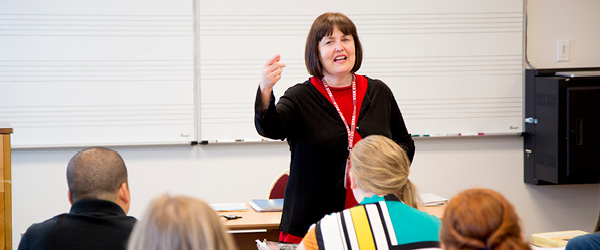
Theory
Small class sizes and seminar formats allow undergraduate and masters level students ample time for collaborative discussion with faculty and peers, giving a firm foundation in music theory for teaching, performance, or future study.
The School of Music offers a comprehensive course of study in music theory, instructing music students from all areas in all stages of their academic career, undergraduate through doctoral. In theory classes, music students delve beneath a surface appreciation of performance to gain deeper insight into the underlying design of a piece of music. In combination with the knowledge and skill development students receive in their history, composition and performance classes, this theoretical understanding ensures the success of graduating music students.
In addition to the general theory classes required of all undergraduate music majors, the school offers a bachelor’s degree in music theory that allows students to complete a special research project under the tutelage of a faculty mentor.
The master’s degree in music theory lays a foundation for further graduate study for students interested in pursuing a university teaching career. Small class sizes and seminar formats allow students ample opportunities for collaborative discussion that strengthens analytical skills. From studies in form and Schenkerian analysis to post-tonal topics, our courses are geared toward current research that addresses important developments in the music theory field. Students take an intensive seminar in music theory pedagogy in preparation for a faculty-supervised student teaching experience of entry-level theory courses. Graduates leave well-prepared to enter a competitive PhD program.
Theory Area faculty speak about their research and theory-related topics as part of the school's Fridays w/Faculty lecture series and also invite academics from other universities to speak on special topics.
Curriculum Requirements
A BMUS in Theory is a four-year, 123 credit hour emphasis consisting of degree requirements (private lessons, music theory, conducting, music history, large ensemble, composition, technology, and additional music courses) and the U of U General Education Requirements and Bachelor's Degree Requirements. A senior project is required.
The MM is a two-year, 32 credit hour program consisting of bibliography, music history and literature, and advanced music theory. A master's thesis is required.
Degrees
Faculty
- Michael Chikinda,
Music Theory Area Head - Pamela Jones
- Luke Dahn
- Paul Sherrill
- Jessica Rudman
- Matthew Durrant
- Haruhito Miyagi
Voice
Voice students at the University of Utah graduate solidly prepared for professional performing and teaching careers. Our faculty of active world-class performers and scholars provide outstanding vocal training, a variety of performance opportunities, world-class choral ensemble experience, and a sense of community to students of all backgrounds. Along with our students, the faculty of the Voice Area share a strong commitment to the performance of works by underrepresented composers.
While at the U, students engage in a variety of academic and performance experiences that encompass opera, oratorio, art song, and choral literature, providing hands-on opportunities to learn vocal technique and stagecraft. To better prepare students for a rich life in addition to performing, recent additions to our offerings include a certificate in Arts Entrepreneurship and a Masters of Music in Vocal Performance and Pedagogy.
Students receive outstanding vocal training and coaching from a distinguished faculty of active performers who balance careers with teaching. Our comprehensive curriculum guides singers to be versatile, creative and technically proficient on- and off-stage.
Regular performance opportunities include a double bill of holiday operas in collaboration with the Grand Theater, one annual full production with orchestra in Kingsbury Hall, as well as opera scenes presented in Libby Gardner Concert Hall. Past opera productions have included La Rondine, Rigoletto, Candide, L’incoronazione di Poppea, Susannah, Sweeney Todd, Dialogues of the Carmelites, Little Women, Suor Angelica, and Gianni Schicchi.
Visiting directors and artists enhance on campus vocal opportunities; alums Stanford Olsen and Celena Shafer give master classes, along with other vocal greats such as Barbara Bonney and Michael Barrett. Strong ties to Utah Opera and Utah Symphony as well as the Cathedral of the Madeleine offer additional learning and performance opportunities for our students. Participation in our choral ensembles allows students to learn a variety of music styles and master works as choristers and soloists.
Curriculum Requirements
A BMUS in Vocal Performance is a four-year, 133 credit hour emphasis consisting of degree requirements (private lessons, music theory, keyboard, conducting, music history, large ensemble, opera, voice and additional music courses) and the U of U General Education Requirements and Bachelor's Degree Requirements. A senior recital is required.
The MM is a two-year, 35 credit hour program consisting of private lessons and coaching, bibliography, music history and literature, advanced music theory, opera workshop and vocal pedagogy. Two master’s recitals and foreign language proficiency are required.
The DMA is a three-year, 59 credit hour program consisting of private lessons, large ensembles, music history and literature, advanced music theory, pedagogy, performance practice and courses in a related field. A dissertation essay, four recitals and foreign language proficiency are required.
Degrees
- BM Vocal Performance 2023-2024
- BM Music Education: Choral 2023-2024
- Bachelor of Arts in Music 2023-2024
- Minor in Music 2023-2024
- MM Vocal Performance 2023-2024
- MM Vocal Performance and Pedagogy 2023-2024
- DMA Vocal Performance 2023-2024
- Chamber Choir
- A Cappella Choir
- Voci Altissime
- U Opera
- Opera Workshop
- New Music Ensemble
- Early Music Ensemble
Faculty
- Seth Keeton, Voice Area Head
- Carol Ann Allred
- Robert Breault
- Kirstin Chávez
- Paul Dorgan
- Lynn Maxfield
- Julie Wright-Costa
Emeritus
Woodwinds
The Woodwinds Area seeks to develop students' maximum musical and technical proficiency on their instruments, providing the foundation for their professional success in both performing and teaching. The comprehensive program works successfully with a variety of students, from the performance major focused on a professional orchestral career to the music education major planning to teach high school students.
In addition to weekly private lessons, students have varied small and large ensemble opportunities in the school's three orchestras, wind ensemble and symphonic band, flute choir, and other small woodwind ensembles. Students are encouraged to compete in festivals and competitions; in 2012 the school's Clarinet Quartet was selected to play at the International Clarinet Association’s annual conference and the Flute Choir was invited to perform at The National Flute Association convention.
Solo performance opportunities await interested students, including an annual concerto competition, with winners performing with the school's top orchestra, the Utah Philharmonia. A thriving DMA program creatures a rich multi-level learning environment for all students.
Our woodwind faculty are active professional performers, involved in Salt Lake City’s thriving music scene, including the Utah Symphony and Ballet West's Utah Chamber Orchestra.
Curriculum Requirements
A BMUS in Instrumental Performance is a four-year, 126 credit hour emphasis consisting of degree requirements (private lessons, music theory, keyboard, conducting, music history, ensemble and additional music courses) and the U of U General Education Requirements and Bachelor's Degree Requirements. A senior recital is required.
The MM is a two-year, 31-34 credit hour program consisting of private lessons, bibliography, music history and literature, advanced music theory, pedagogy and ensembles. Two master’s recitals are required.
The DMA is a three-year, 59 credit hour program consisting of private lessons, large ensembles, music history and literature, advanced music theory, pedagogy, performance practice and courses in a related field. A dissertation essay and four recitals are required.
Degrees
- BM Instrumental Performance 2023-2024
- BM Music Education: Instrumental 2023-2024
- Bachelor of Arts in Music 2023-2024
- Minor in Music 2023-2024
- MM Instrumental Performance 2023-2024
- DMA Instrumental Performance 2023-2024
- Marching Band
- Pep Band
- Symphonic Band
- Wind Ensemble
- Philharmonia
- Philharmonia Chamber Orchestra
- Campus Symphony
- Jazz Ensembles
- Jazz Combos
- New Music Ensemble
- Early Music Ensemble
Faculty
- Laura Grantier, Woodwind Area Head
- Mark Ely
- Lisa Byrnes
- Henry Caceres
- Randal Clark
- David Halliday
- Caitlyn Moore
- Jennifer Rhodes
- Tiffany Sedgley
- Robert Stephenson
- Erin Voellinger
- Lori Wike
Emeritus

